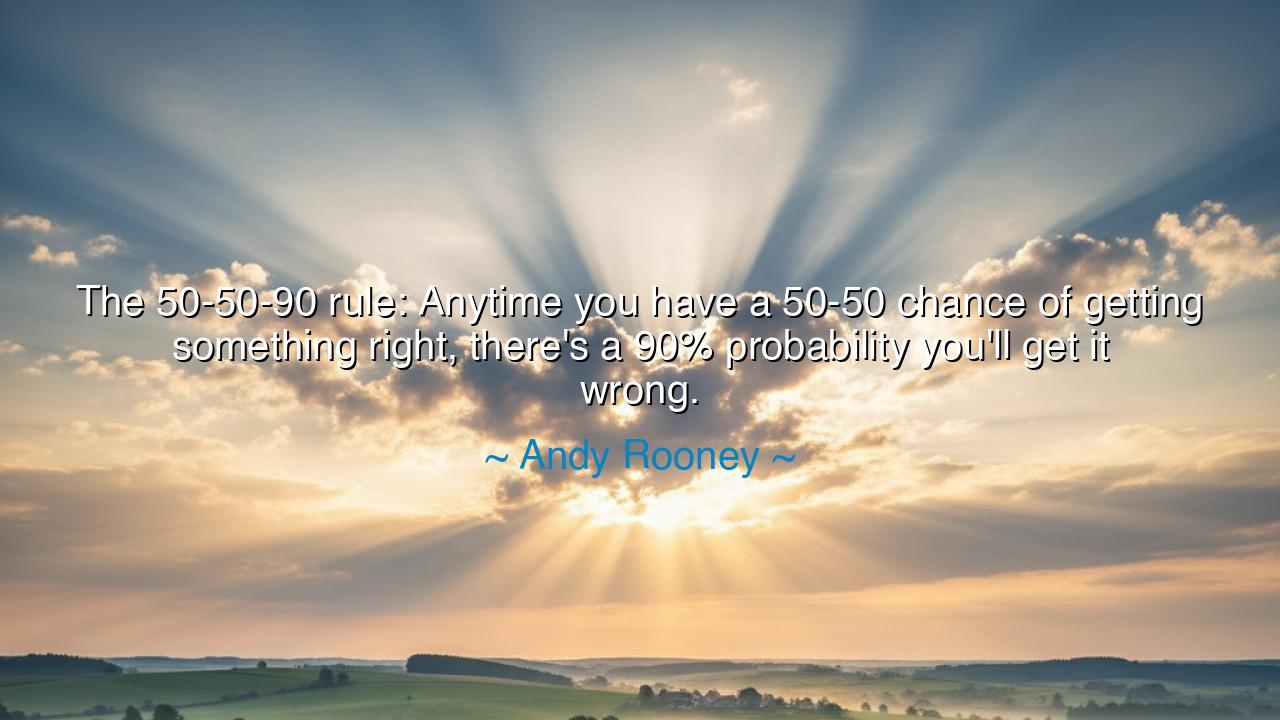
The 50-50-90 rule: Anytime you have a 50-50 chance of getting
The 50-50-90 rule: Anytime you have a 50-50 chance of getting something right, there's a 90% probability you'll get it wrong.






Host:
The rain drummed steadily against the wide windows of the small downtown diner, turning the city outside into a watercolor of lights and motion. The air smelled faintly of coffee, damp wool, and late-night resignation. Inside, the neon sign buzzed its tired hum above the counter, flickering now and then — like the world itself was laughing at human predictability.
At a booth by the corner, Jack and Jeeny sat facing each other, the table between them littered with half-drunk mugs and scattered receipts. A small radio behind the counter muttered old jazz through static.
Jeeny scrolled through her phone, then looked up with a half-smile.
Jeeny: (reading aloud, with a chuckle) “The 50-50-90 rule: Anytime you have a 50-50 chance of getting something right, there’s a 90% probability you’ll get it wrong.” — Andy Rooney.”
Jack: (grinning dryly, stirring his coffee) “Ah, Rooney. The philosopher of everyday humiliation. The man understood probability the way most of us understand irony.”
Jeeny: (laughing) “It’s painfully true, though. The universe has this way of punishing confidence. Every time I think, ‘It’s a simple choice, two outcomes, can’t mess this up’ — I mess it up.”
Jack: (leaning back, with mock gravity) “That’s not bad luck, that’s design. The universe runs on irony. It waits for the moment you finally trust yourself — then flips the coin.”
Host:
The neon light caught Jack’s face, outlining the edges of his smirk, the faint exhaustion in his eyes. Jeeny was smiling, but her expression carried that quiet acknowledgment shared by two people who’d both been burned by fate’s sense of humor.
Jeeny: (sipping her drink) “But isn’t that what makes us human? We keep betting against the odds, even when the odds have laughed in our face every time. It’s like we’re addicted to the illusion of control.”
Jack: (nodding slowly) “Exactly. We’re gamblers dressed as rational beings. We call it choice, but most of the time it’s just hope with paperwork.”
Jeeny: (laughing softly) “Hope with paperwork — that’s brilliant. But Rooney’s right: even when the odds are fair, we sabotage them. We overthink, we hesitate, we let bias or fear tilt the coin before it even lands.”
Jack: (raising an eyebrow) “And then we blame fate. Or God. Or the weather. Anything but ourselves. That’s the human trick — outsourcing accountability to the cosmos.”
Host:
A gust of wind pushed rain harder against the window. The reflections of streetlights rippled like coins tossed into dark water — chance incarnate. The diner’s warmth felt fragile, temporary, like the eye of a storm built from irony and caffeine.
Jeeny: (musing) “It’s strange though. We laugh at the 50-50-90 rule because it’s funny, but there’s something deeper in it. Maybe it’s about humility — a reminder that even when things seem balanced, we’re still the variable that ruins the equation.”
Jack: (smirking, but softer now) “You’re right. It’s not about the math — it’s about the margin of human error. We’re wired to misjudge. We mix instinct with ego and call it decision-making.”
Jeeny: (leaning forward) “So you think failure is inevitable?”
Jack: (shaking his head) “No, not inevitable — necessary. The 50-50-90 rule just means that life’s outcomes are rigged toward learning, not winning. You screw up, you adjust, you evolve. If we got it right every time, we’d never develop depth. We’d be perfect — and soulless.”
Host:
The rain softened. The radio changed songs — a slow saxophone tune that filled the space between their words. Jeeny rested her chin in her hand, watching Jack’s reflection in the window — blurred, distant, almost double, like two versions of him arguing silently.
Jeeny: (smiling faintly) “So maybe getting it wrong most of the time isn’t failure, it’s calibration.”
Jack: (grinning) “Exactly. Life’s a series of missed guesses that point you closer to truth. Rooney’s humor hides something profound — that wisdom is mostly just a long history of errors survived.”
Jeeny: (laughing softly) “You make mistakes sound noble.”
Jack: (raising his cup) “They are. Mistakes are the tuition we pay for being alive.”
Jeeny: (clinking her mug against his) “And the 90% fee for our 50% confidence.”
Jack: (smiling) “A bargain, really.”
Host:
The sound of laughter mingled with the clinking of cups — the small, real music of shared truth. Outside, a taxi hissed through the rain. Inside, time felt suspended in that soft, cinematic kind of peace that exists only when two people understand the absurdity of life together.
Jeeny: (after a quiet moment) “You know, what I love most about Rooney’s line is that it doesn’t try to fix anything. It just observes. It says — this is who we are. Predictably flawed, consistently uncertain, but still trying.”
Jack: (leaning back, thoughtful) “Yeah. It’s not cynical, it’s human. There’s a difference. Cynicism mocks failure. Humor forgives it.”
Jeeny: (nodding) “And laughter — that’s our rebellion against inevitability.”
Jack: (softly) “Our way of saying: I know I’ll get it wrong again, but I’ll still try.”
Host (closing):
The rain eased into a drizzle. The neon outside flickered once more, then steadied. The world looked cleaner somehow, like every drop had washed away the heaviness of certainty.
Andy Rooney’s words lingered like the aftertaste of coffee and truth:
"Anytime you have a 50-50 chance of getting something right, there’s a 90% probability you’ll get it wrong."
And as Jack and Jeeny sat quietly, listening to the rhythm of the rain and the hum of the night, they both smiled —
because failure, it seemed, was not defeat,
but proof that they were still in the game.






AAdministratorAdministrator
Welcome, honored guests. Please leave a comment, we will respond soon